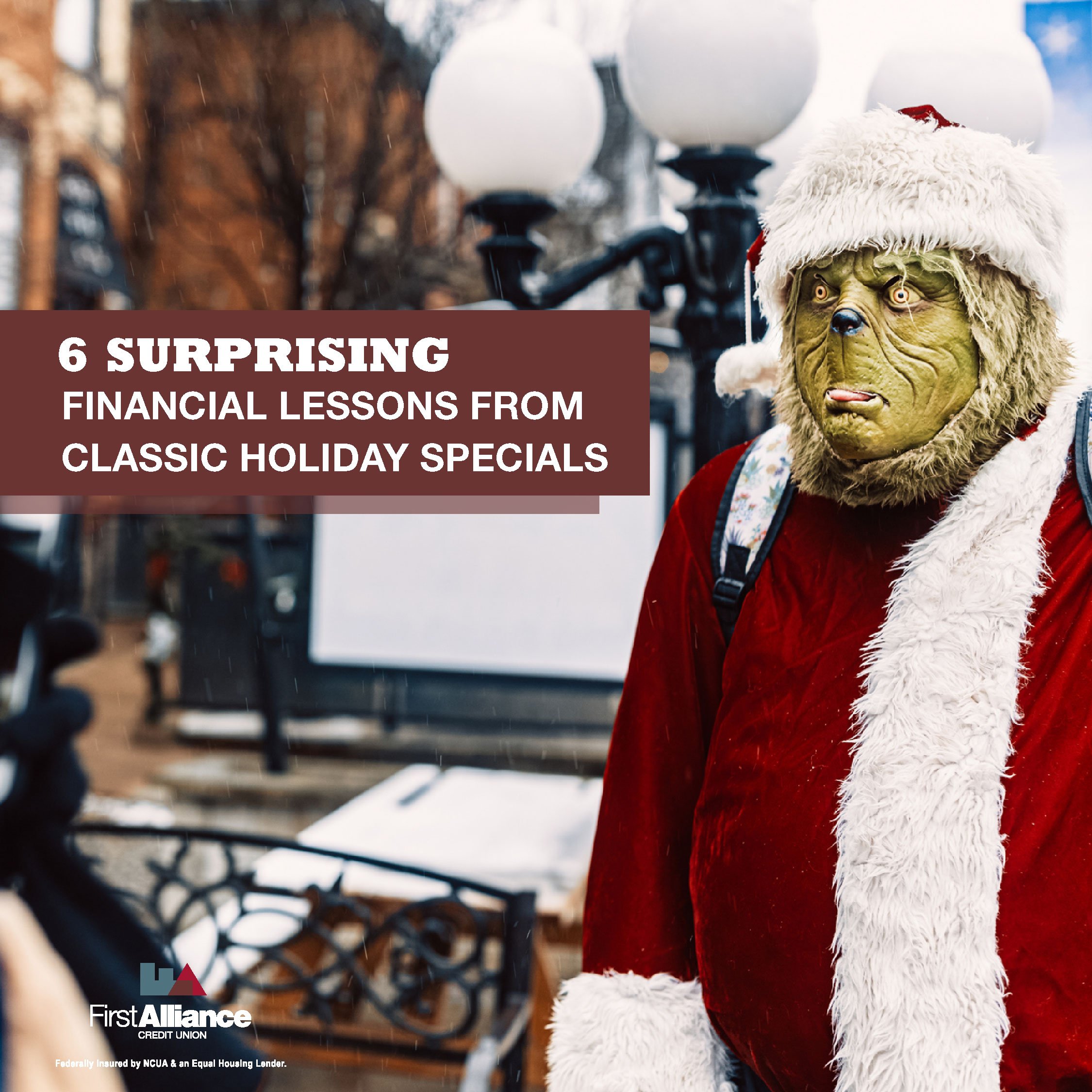How To Go Christmas Shopping Without Going Bankrupt
As you may have heard from Alvin and the Chipmunks, Christmas, Christmas, time is here. Time for toys and time for cheer. The only problem is that in...
5 min read
 Chris Gottschalk
:
Dec 7, 2021 4:45:00 AM
Chris Gottschalk
:
Dec 7, 2021 4:45:00 AM

One of the multiple signs that the holidays are upon us is the sudden proliferation of holiday specials on TV and streaming. It’s no exaggeration to say there’s a holiday special for everyone, whether you’re looking to see the definitive edition of a time-honored holiday story or just want a winter romance story to warm the frozen cockles of your heart.
![]() While these specials are all about celebrating the holidays, they also have some important financial lessons to share. The best part? You can use the lessons from these holiday favorites all year round.
While these specials are all about celebrating the holidays, they also have some important financial lessons to share. The best part? You can use the lessons from these holiday favorites all year round.

The main plot of the Frosty the Snowman special revolves around less-than-stellar magician, Professor Hinkle, tossing away his defective magic top hat, only to try to get it back from Frosty when he realizes it actually is magic. It’s a pretty clear lesson that you shouldn’t get rid of something without knowing what it’s actually worth.
The biggest way you can figure out the true worth of something is by taking the time to come to your own opinion on it. This might entail doing some research to discover that the odds of that lottery ticket aren’t as great as you initially thought or figuring out that the high-end television might not be that much better than one of the budget TVs.
It’s worth mentioning, though, that the most important thing you should know the true worth of is yourself. This doesn’t just mean knowing your net worth or keeping track of how much you have in your retirement fund. It also means being aware of all your talents, knowing your positive qualities and making sure your job is paying you what you’re worth.
While Rudolph the Red-Nosed Reindeer didn’t fit in because he looked different, his elf friend, Hermey, had a slightly different problem. He didn’t look different than anyone else, but he didn’t want to follow the same path as the other elves. Unlike Rudolph, Hermey had the option to fit in if he wanted, but he ultimately had to follow his own path.
A lot of people might be feeling like there’s a different path calling them, especially in the wake of the pandemic. They might want to get a different job, for instance, or even start up their own company. However, they might be scared to actually follow that path, and understandably so.
Let’s be honest—following your own path is rarely easy. It takes a lot of planning and hard work to strike out on your own, whether you’re taking a different job than your family thinks you should take or even opening up your own business. There’s also no guarantee that you’ll succeed.
Having said that, if you feel like you need to follow your own path, you owe it to yourself to at least try. Many surveys have revealed that the biggest regret people have at the end of their lives is that they didn’t live a life that was true to themselves. It’s also worth pointing out that if you have a goal you’re passionate about, you’re going to work harder and longer at it, and that substantially increases your chances of success.
The lesson behind the Grinch who stole Christmas is pretty clear. Even though the Grinch snuck through Whoville on Christmas Eve, disguised as Santa Claus, and rode off on his sleigh with all the Christmas trees, jingle bells and roast beasts, he did nothing to stop the Christmas cheer of the Whos when Christmas day arrived. Because, after all, Christmas wasn't about the material goods.
This is a lesson that practically everyone has heard at some point, but it still bears repeating—the best things about the holidays aren’t the things. We all know that money is important, and the more money you have the nicer things you can buy, but money can’t buy the love of your family, the respect of your friends, or real, lasting happiness.
This is especially important to keep in mind during a period where prices seem to be rising rapidly. You might feel discouraged that your money isn’t going as far as it would in other years, but the truth has always been that you don’t need to spend thousands of dollars to have a happy holiday. It’s easy to get caught up in the glitz and glamour of the holidays, but at its core the holidays are about your love for your friends and family.
The beginning of a Muppet Family Christmas starts with Fozzie Bear bringing his friends to surprise his mom, who was originally going to be spending the holidays in Malibu. It ends with the Muppets from both The Muppet Show and Sesame Street staying the night and celebrating Christmas together. Fozzie's mom, while not thrilled at first, eventually acknowledges that having so many people around for the holidays is pretty nice.
You don't have to be around other people all the time, but many times, the more people there are involved in something, the better it gets. By far the clearest example of this is a credit union. The more people that become members, the stronger the credit union gets and the more it can provide for its members as a result.
Most of the promotional artwork for A Charlie Brown Christmas is usually pretty happy. Either Charlie Brown is looking at his pathetic little Christmas tree with a big smile on his face, or Charlie Brown and the rest of the Peanuts gang are standing in front of the rejuvenated Christmas tree with big smiles on their faces.
As anyone who has ever seen A Charlie Brown Christmas knows, though, the art is a bit misleading. The whole plot of the animated special revolves around Charlie Brown feeling depressed and not being able to get into the holiday spirit, and the other kids (and Snoopy), with their idiosyncrasies, are somewhat less than helpful.
Let’s be frank—with very few exceptions, the last two years haven’t been easy on anyone. Most of us are dealing with the pandemic and the repercussions it’s caused throughout multiple industries, and now we’re dealing with the time of year where we’re all supposed to be not only happy, but willing to put in a lot of behind-the-scenes work to be happy on the holidays.
If there’s only one thing you take away from watching A Charlie Brown Christmas this year, it should be that it’s okay to not be okay. If you’re stressed or depressed, it doesn’t mean you’re weak or defective somehow. In fact, the worst thing you could do is to pretend you’re okay. Don’t be afraid to reach out to someone, from a loved one to a mental health worker.
One thing to keep in mind is that a lot of people don’t ask for help, especially financial help, is because they’re afraid of the answers they’ll get. Talking to a mental health worker might reveal that there’s something seriously wrong, or a financial advisor will inform you that your financial situation is worse than you feared.
The truth is that, while you might not like the answer you get, the end result of asking for help is almost always positive. By asking for help, you get the opportunity to move forward, whether it’s because you’ve gotten the information you need to move ahead or because you’ve learned new skills that will help you move in the direction you want to go.
If you want to ask for help, it's best to do it face-to-face. Be clear about what you want, and make it clear you're asking for a favor instead of trying to frame your request about what you'll do for them in return. Finally, don't apologize about needing help.
There were a lot of financial lessons to be learned when Mickey Mouse and his friends did their version of Charles Dickens' immortal story, "A Christmas Carol" on The Wonderful World of Disney. However, we've already covered these financial lessons in another blog. Take a look!
As November ends and December begins, a lot of holiday specials get aired. They're fun to watch, but they also have important lessons about the importance of catching up with family and friends, taking stock of what's truly important in your life and just making sure you're okay.
At First Alliance Credit Union, the most important thing for us is our members. Thank you all for being part of our credit union, and have a happy holiday season.

As you may have heard from Alvin and the Chipmunks, Christmas, Christmas, time is here. Time for toys and time for cheer. The only problem is that in...

The winter holidays are supposed to be a time of relaxation and hanging out with friends and family, but let’s be honest—the weeks leading up to the...

Using your credit card to do your holiday shopping has a lot of advantages. However, there is one big advantage--it's easy to overspend. Most people...